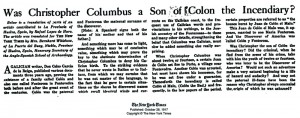Below in a translation of parts of an article contributed to La Provincia of Huelva, Spain by Rafael López de Haro. The article tras translated for The New York Times by Mrs. Berndard Whishaw, of La Puerta del Buey, Niebla, Province of Huelva, Spain Honorary Secretary of the Anglo-Spanish School of Archaeology.
A GALICIAN writer, Don Celso García de la Reiga, published various documents three years ago, proving the existence of a family called Colón and 01te called Fonterosa in Pontevedra botfa before and after the great event of the centuries. Colón was the paternal and Fonterosa the maternal surname of the discoverer.
[Note: A Spaniard’ signs both the ñame of his’ mother and that of his father.]
And something more has come to light, something which may be of conclusive valué, something which may prove the key to the obstinate determination of Christopher Columbus to deny his Galician birth. To the striking evidence that be never wrote in Italian or to Italians, from which we may surmise that he was not master of the language, to the fact that be gave to certain situations on the shores he discovered names which recall identiral winde and currents on the Galician coast, to the frequent use of Galician words and provincialisms in his writings, to the Jewish ancestry of the Fonterosas—to these and many other details, strengthening the belief that Columbus was Galician, must now be added something else really surprising.
When Christopher Columbus was about twelve or fourteen, a certain Juan de Colón set fire to Porto, a village near Pontevedra. Another Colón was arrested, but must have shown his innocence, for he was set free under a guarantee. Thenceforth the incendiary is called Colón el Malo, (Colón the Bad,) and frequently, in the law papers of the period, certain properties are referred to as “the houses burnt by Juan de Colón el Malo.”
This Juan de Colón el Malo wasr it appears, married to one María Fonterosa. And the Discoverer of America was called Colón y Fonterosa.
Was Christopher the son of Colón the incendiary? Did the criminal, when be fled from the scene of his crime, take with him the youth of twelve or fourteen, who was later to be the Discoverer of America?. Would not such an adventure make a very natural beginning to a life of hazard and audacity? And may not the paternal ill-fame have been the reason why Christopher always concealed the origin of which he was ashamed?
